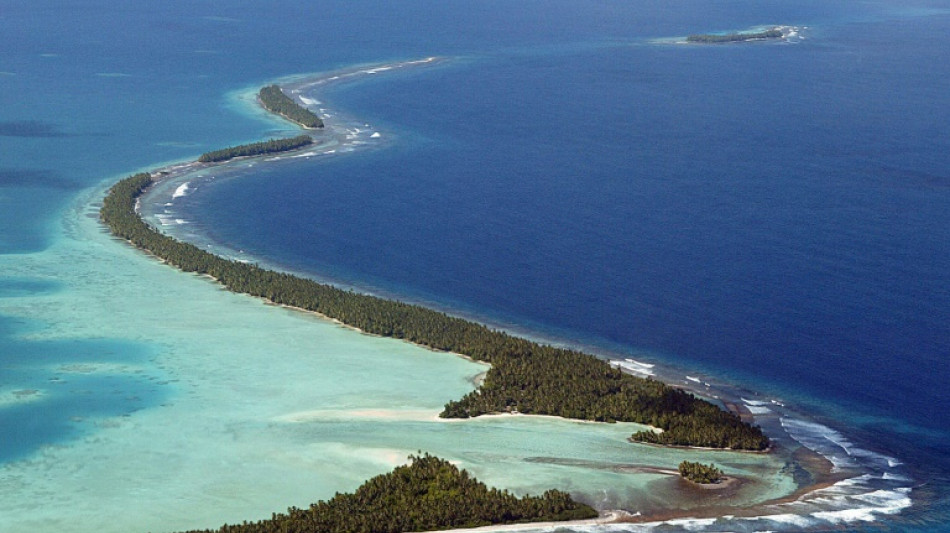
-
 Vietnam says it will start trade talks with United States
Vietnam says it will start trade talks with United States
-
Expo 2025 in Japan: five things to know

-
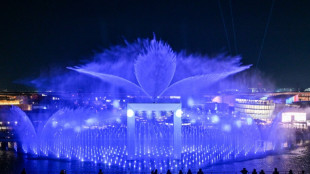 Japan's World Expo touts unity, and algae, in turbulent times
Japan's World Expo touts unity, and algae, in turbulent times
-
Trump's tariff pause gives market relief, but China trade war intensifies

-
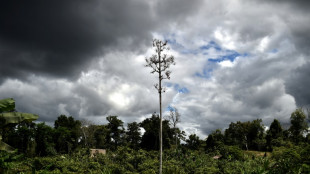 Papua New Guinea lifts ban on forest carbon credits
Papua New Guinea lifts ban on forest carbon credits
-
AI surge to double data centre electricity demand by 2030: IEA

-
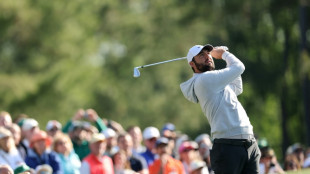 Scheffler, McIlroy seek fast start in hunt for history at Masters
Scheffler, McIlroy seek fast start in hunt for history at Masters
-
Samsung under pressure as US tariffs rattle South Korean economy
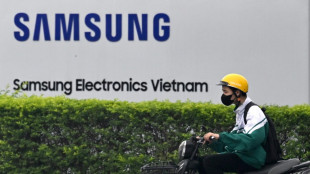
-
 Munster wary of 'chaotic' Bordeaux-Begles in Champions Cup quarter-final
Munster wary of 'chaotic' Bordeaux-Begles in Champions Cup quarter-final
-
Ranieri eyeing Champions League for Roma before derby swansong
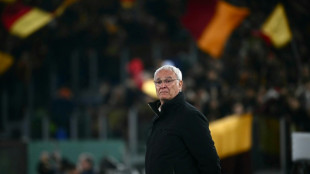
-
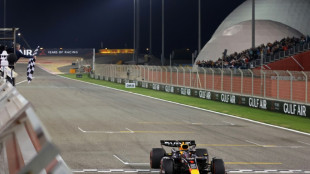 Verstappen out to silence McLaren in the battle of Bahrain
Verstappen out to silence McLaren in the battle of Bahrain
-
Asian stocks crack higher as Trump delays painful tariffs

-
 Cannes to unveil film selection under pressure over industry abuse
Cannes to unveil film selection under pressure over industry abuse
-
Messi scores twice in Miami's frantic comeback over LAFC

-
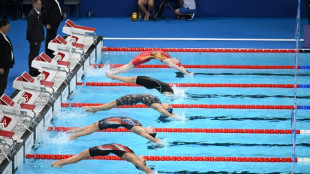 Swimmers get medal boost with new events added for 2028 Olympics
Swimmers get medal boost with new events added for 2028 Olympics
-
Companies keen to start deep-sea mining off Norway

-
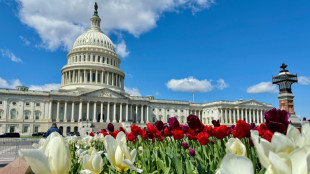 US House votes to limit judges' injunction power
US House votes to limit judges' injunction power
-
Pilgrims in Italy flock to tomb of first millennial saint
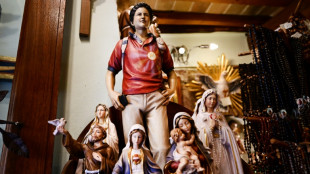
-
 China consumer prices slump for second straight month: data
China consumer prices slump for second straight month: data
-
Tearful Doncic scores 45 on return to Dallas as Lakers clinch playoff spot

-
 Hamas leadership operating behind veil of secrecy
Hamas leadership operating behind veil of secrecy
-
Trump stuns with tariff backtrack but hikes China rate to 125%
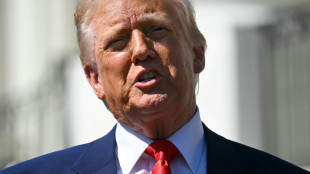
-
 Messi scores twice in Miami's three goal comeback over LAFC
Messi scores twice in Miami's three goal comeback over LAFC
-
Amazon satellite launch scrubbed due to weather
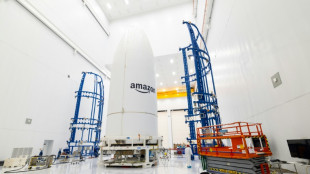
-
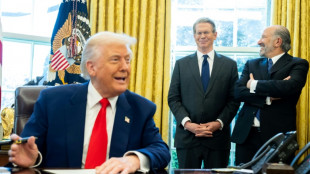 Art of the deal? How Trump backed down on tariffs
Art of the deal? How Trump backed down on tariffs
-
Relief Therapeutics Reports 2024 Financial Results and Provides Corporate Update

-
 Tocvan Commences Drilling at Gran Pilar Gold - Silver Project Continues Expansion Zone Drilling Along Northern Corridors
Tocvan Commences Drilling at Gran Pilar Gold - Silver Project Continues Expansion Zone Drilling Along Northern Corridors
-
Aston Villa boss Emery remains bullish despite defeat in Paris

-
 Barca still improving: Flick warns rivals after thrashing Dortmund
Barca still improving: Flick warns rivals after thrashing Dortmund
-
Echavarria risks Masters Par-Three Contest curse with playoff win

-
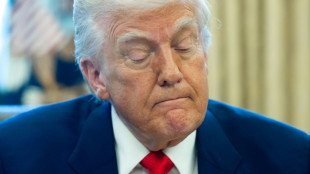 Who stands in the crosshairs of Trump's tariffs?
Who stands in the crosshairs of Trump's tariffs?
-
US stocks soar on Trump tariff reversal, oil prices jump

-
 Salah getting closer to new Liverpool deal: reports
Salah getting closer to new Liverpool deal: reports
-
NBA rescinds Doncic ejection foul in Thunder loss

-
 Cricketer De Villiers gets a Masters hit with pal Bezuidenhout
Cricketer De Villiers gets a Masters hit with pal Bezuidenhout
-
Saudi top diplomat in US to prepare for Trump visit
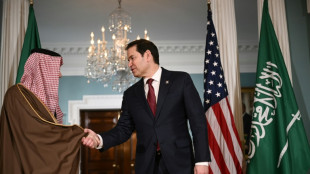
-
 Kvaratskhelia genius helps give PSG Champions League edge against Villa
Kvaratskhelia genius helps give PSG Champions League edge against Villa
-
Sensational Barca destroy Dortmund in Champions League mismatch

-
 Author of explosive Meta memoir stars at US Senate hearing
Author of explosive Meta memoir stars at US Senate hearing
-
King Charles addresses Italian parliament, greets pope on visit to Rome
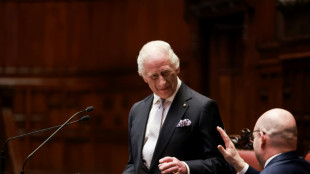
-
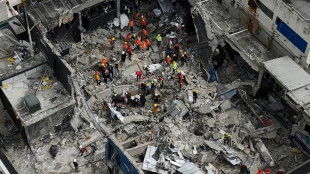 Dominican Republic ends search for nightclub collapse survivors
Dominican Republic ends search for nightclub collapse survivors
-
Pentagon chief says US could 'revive' Panama bases
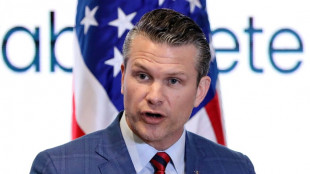
-
 Trump stuns with tariff backtrack but punishes China
Trump stuns with tariff backtrack but punishes China
-
King Charles jokes, cites Monty Python at Italian state banquet
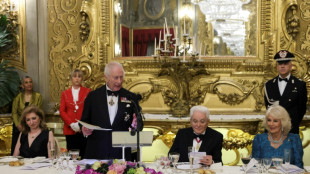
-
 Strength in numbers: Latin America urges unity in face of Trump tariffs
Strength in numbers: Latin America urges unity in face of Trump tariffs
-
France could recognise Palestinian state 'in June': Macron
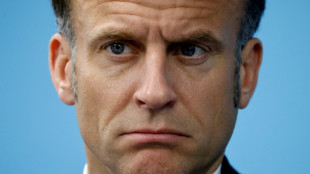
-
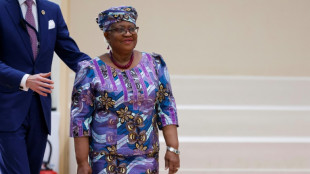 Tariff war could cut US-China goods trade by 80 percent: WTO chief
Tariff war could cut US-China goods trade by 80 percent: WTO chief
-
Europa League success 'massive' for Man Utd, says Amorim

-
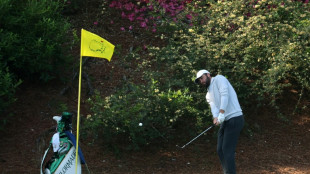 Scheffler tunes out talk of history in Masters title defense
Scheffler tunes out talk of history in Masters title defense
-
Turkey opposition to fight Erdogan 'until the end': leader tells AFP
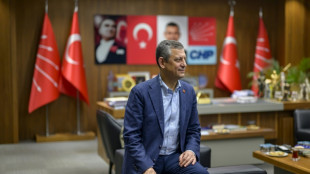

Pacific nations perplexed, worried by Trump tariffs
Pacific island nations hit hardest by US President Donald Trump's trade tariffs are querying the "unfair" impost, and they are fearful of the impact.
The United States has punished Fiji, Vanuatu and tiny Nauru for running trade surpluses with the economic superpower, slapping them with duties far above its new 10-percent baseline.
Besides squeezing their finances, analysts say the US levies are making Pacific countries wary of their historic ally, which has already cut humanitarian aid programmes.
"It's just another reason to have less trust in the US, stacked on top of the US aid freeze," said Blake Johnson, senior analyst at the Australian Strategic Policy Institute think tank.
It also creates opportunities for China to expand its ties from aid to trade, he said, as Beijing vies with the United States and its allies for influence in the geographically strategic region.
Among the Pacific countries' biggest sellers in the United States are the traditional narcotic kava drink, and spring water under the brand Fiji Water -- owned by Los Angeles-based The Wonderful Company.
The 22-percent tariffs on Vanuatu are expected to impact exports and hurt kava farmers, a spokesperson for the prime minister said.
-'Just suck them up' -
Vanuatu was hit by the tariffs after running a US$6.6 million surplus in its trade of goods with the United States last year, according to UN data.
Jonathan Naupa, owner of Vanuatu kava exporter Mount Kava, said demand for kava was high and he had no plans to cut prices for the US market.
"We are going to keep our prices right where they are -- the American public can just suck them up," he told AFP, adding that there was a growing global market for kava exports.
He welcomed Trump's move.
"I actually think it's a good thing that he's done this because it will make the Americans realise that they need to treat our cultural product with a bit more respect," he said.
"With the shortage of kava in Vanuatu, I don't see prices going down, and I hope my fellow exporters also try to follow suit and not drop their prices."
Nauru's main exports include the remnants of its once-vast phosphate deposits and the sale of fishing rights, but it was not clear what made up its 2024 goods trade surplus with the United States of $1.4 million -- about the price of a one-bedroom apartment in Manhattan.
It faces a 30-percent US trade tariff.
Fiji runs a larger surplus in the trade of goods with the United States of about $252 million helped by exports of Fiji Water, kava and fish, and it now faces a 32-percent tariff across the board.
- 'Unfair' -
The beach-fringed tourist magnet says it applies zero or five-percent duty on 96 percent of US imports.
Trump's levy "is quite disproportionate and unfair", Finance Minister Biman Prasad said in a statement.
"We are still trying to get more details on the exact rationale and application of the newly announced retaliatory tariff by the US and will work with our key stakeholders and US counterparts to get this," he said.
Roland Rajah, director of the Indo-Pacific Development Centre at the Lowy Institute think tank, said the tariffs were based on the scale of US trade deficits with each country.
But it makes economic sense to have a trade deficit with some countries and a surplus with others, he said.
"It's not necessarily driven by particular policy distortions," Rajah added, making it hard for countries to find a basis for trade talks with the United States.
"The other factor for the Pacific is that being small countries and quite small trading partners in the world it might be very difficult for them to get a hearing with the Trump administration, who will have bigger fish to fry at the current moment."
Papua New Guinea, the most populous Pacific island country, said it had no plans to retaliate against the US decision to impose a 10-percent tariff.
"We will continue to strengthen our trade relations in Asia and the Pacific, where our produce is welcomed," Prime Minister James Marape said in a statement.
"If the US market becomes more difficult due to this tariff, we will simply redirect our goods to markets where there is mutual respect and no artificial barriers."
A.Mahlangu--AMWN